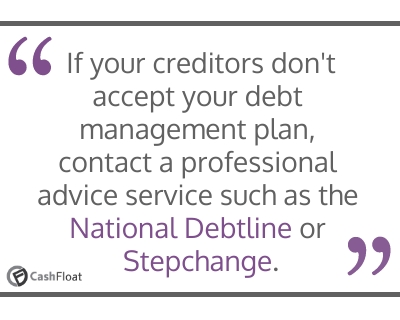Some debt management companies charge a hefty fee while others require lots of paper work. Can I manage my own debt management plan? Cashfloat finds out.


- Debt charities are the best debt help providers
- A debt charity may advise you to begin a debt management plan, and make the negotiations on your behalf
Cashfloat is a UK short term loans company which aims to change the loans industry. We have already reinvented traditional short term loans for bad credit to be a more responsible and affordable product.
In this guide to debt management plans, we aim to help people who are experiencing debt problems. This article answers one question that many people ask – ‘can I manage my own debt management plan’?
Finding the Best Way to Arrange a Debt Management Plan
Debt management plans (DMPs) are a common solution to debt and are used by many people in the UK. They are used to pay off debts where the person who is in debt has some spare money to make payments towards their debts, but not enough to make the payments that they originally agreed to when they borrowed money. Under a debt management plan, you will repay your debt in full but at reduced monthly amounts.
When the time comes to resolve a debt problem, many people are unsure how to approach the situation. If they have heard of debt management plans, they may be unsure of how to go about starting one or whether they should start one at all. Should you keep struggling to make minimum payments and avoid a debt management plan? Should you give up and let the creditors decide which one will take you to court first? Or, should you start a debt management plan?
If you decide that you do want to start a debt management plan, do you ask for professional help to set it up? Or, do you manage it by yourself? Is this even possible and, if it is, what are the benefits and drawbacks of doing it by yourself?
Could Running Your Own Debt Management Plan be a Way Out of Debt?
The idea of going it alone and being in control of their own debt management plan is appealing to some people. Rather than having to trust their finances with a DMP provider, many people would like to have control over what is happening.
It is possible to run your own DMP and some people do. However, the most important point is that it can be difficult and, for most people, there is no need to go to the lengths of arranging their own DMP when it can be arranged for free by a professional charitable organisation. Arranging a debt management plan will be particularly difficult for people who are inexperienced with financial matters. Even for people who are confident in their ability to arrange one, it can be difficult. This is especially true where debts are owed to several creditors who are all clamouring for payment.
The vast majority of people, particularly anyone who is struggling to cope because of stress or depression caused by debt would be better off asking for professional help. That said, you may like to know more about running your own debt management plan. Read on to find out.


Before embarking on a debt management plan make sure that you have discussed your situation with a professional and impartial debt advisor. It is important that you are sure that tackling your debts with a DMP is the right thing to do. There are many solutions to debt, besides debt management plans. Professional and impartial advice can be obtained for free from charitable organisations, such as StepChange and National Debtline. Many of these charitable organisations will also provide a DMP to people free of charge, as well as providing guidance.
How Hard is it to Manage Your Own Debt Management Plan?
When you set up a debt management plan you will have to carry out negotiations with your creditors. While debtors do often negotiate with their creditors for various reasons, it can prove to be a difficult and complicated process. This is particularly true when you are dealing with several creditors.
- Contacting Your Creditors
- Arranging the Monthly Payment
- Managing the Plan
You will need to ask your creditors to accept lower payments than those you originally agreed to and, for the plan to work, it will also be important to try and freeze any fees and interest on your debts. While it is possible for people to do this by themselves, it can be difficult. Charities which provide DMPs are experienced in dealing with creditors, do their best to negotiate fair payments and act in the best interests of their clients. For most people it is easier to get a charity to do it on their behalf.
Once you have set up your own debt management plan, you will also need to make monthly payments to cover all of your debts. Where there are several creditors to pay, this can be complicated. One of the advantages of going through a debt management plan provider is that you will only need to make one monthly payment to them and they will distribute this, for you, amongst your creditors.
After the initial negotiations with creditors have been handled and after payment arrangements have been made there will then be the ongoing management of your DMP. Creditors will often require you to review your payments and to demonstrate that you are not able to make higher payments after a period of time. All of this requires work on your part, which can be difficult and stressful.
The above points demonstrate the main challenges of arranging your own debt management plan. While it is easy to see why arranging your own DMP is unappealing to most people, some people still believe that they can get a better deal by arranging their own. Read on to find out how you can go about arranging your own debt management plan, if you wish to do so.
How Do You Go About Managing Your Own Debt Management Plan
The hardest thing about setting up a debt management plan is the amount of work you need to put in at the start of the process.
Budget Yourself
The first step to creating your own DMP is working out how much you can pay your creditors and, to do this, you will need to budget yourself.
Firstly you have to work out payments for your priority debts. These cover mortgage or rent payments, utility bills, any child support payments, council tax and any payments that are due to a court for fines, amongst other things.
You will need to give these debts priority and make payments towards them before you pay other creditors under a DMP. If you fail to keep up the payments for priority debts you could, potentially, become homeless or even be taken to court and sent to prison. After you have calculated how much you will need to spend on your priority debts, you will need to calculate your monthly living expenses. This is for things such as food, clothing and transport. Remember to include infrequent essential expenses, such as for car repairs in your monthly living expenses. You must budget enough for yourself, in your living expenses, to provide a reasonable quality of life to you and your family.
After you have added together your priority debts and living expenses, you will need to subtract these from your monthly income. The surplus money that you have is money that you will pay to your creditors under your DMP. It is important to document your budget carefully as you will need to present it, as a statement of affairs, to your creditors when you try to negotiate your DMP. This could mean compiling bank statements, payslips and other documents which you can use to prove your financial situation. Check out the Citizens Advice Bureau website where there is a free financial statement generator, among other things that may help you.


Negotiating a Debt Management Plan With Your Creditors
After you have budgeted yourself, you will then carry out the hardest part of the process, which is negotiating reduced payments with your creditors. Based on what you can afford after you have budgeted yourself, you will need to make a payment offer to them.
You will be asking them to accept lower monthly payments to those that you originally agreed to. Also, for a debt management plan to work, it will usually be necessary for your creditors to freeze interest and charges while your debt management plan is in place. This is to stop your debt from increasing while you are on your DMP, making it difficult for you to repay the money. You will need to offer each creditor a proportionate amount of the money that you have available to pay towards your debts. For example, if you owe four creditors the same amount of money, they should each get 25% of the money that you have available.
If They Accept Your Offer
If you can prove that you are unable to meet your normal payments, but you can offer reasonable payment amounts and repay your debts in a reasonable amount of time, many creditors will be willing to accept your DMP. The process can start without too much difficulty if your creditors accept the proposal. While there will be ongoing management of your DMP, essentially you just need to begin making the payments that you have agreed to and stick to them until you have cleared your debt.
Set Up Standing Orders
If you have been able to come to an agreement, you should set up monthly standing orders to each creditor for the agreed amounts. Initially, you may still receive contact from your creditors, which can be stressful. However, after you begin to make payments under your DMP this contact should stop as your creditors accept that you will be paying them under the plan that you have agreed with them.
If They Don’t Accept Your Offer
If your creditors don’t accept the offer that you have made, things will become more complicated. You may be able to renegotiate the terms with them and come to an agreement. Alternatively, it may be that a different debt solution is more appropriate. At this point, we would suggest seeking outside support from an impartial debt advisor, such as StepChange of National Debtline.


Managing Your Debt Management Plan Successfully
Once a debt management plan has been set up it should run fairly smoothly, as long as you do not fail to make the agreed payments. Creditors may ask for periodical reviews of your debt management plan, for example every six months or once a year. When your situation remains the same you will, usually, just need to send another statement of affairs to confirm this and be able to continue your DMP under the original agreement.
If Your Situation Changes or Your Creditors Refuse to Stick to the Plan
If your situation changes this may mean that you need to renegotiate the terms of your debt management plan. This could be if you either have more or less money available to you to repay your debts. If more money becomes available to you, you will normally need to inform your creditors of this and increase the amount that you pay to them. This will mean that you will be able to repay your debts more quickly. On the other hand, if less money is available to you, you will need to speak to your creditors and see if they are willing to accept lower payment amounts.
If your creditors refuse to stick to the agreement that you made under your debt management plan, this can cause problems. If this happens, you may need to deal with creditors who refuse your DMP outside of it or renegotiate your agreement with your other creditors. It is a good idea to seek impartial debt advice in this situation. While it is possible that this will happen, as we will explain below, it is unlikely that, after creditors have accepted a debt management plan, they will back out of it.
Will My Creditors Stick to My Debt Management Plan?
As debt management plans are an informal agreement, it is always possible for a creditor to reject the deal and pursue you for the money that you owe them. However, as you will have proven to your creditors in your budget, what you are able to offer is all that you can afford. This means that creditors are unlikely to get more money out of you by pursuing you for debts in court than they would by accepting what you offer under your DMP. The added cost of taking you to court makes it more commercially appealing for them to accept what you offer under your debt management plan.


In Summary…
If you do decide to go it alone and set up your own debt management plan, the hardest part will usually be at the beginning. Once it is up and running, unless your circumstances change, things should go smoothly if you keep to the payments that you have agreed with your creditors.
Setting up a debt management plan is within the capabilities of people who are financially savvy and are able to deal with the stress and challenges that they will meet. However, for most people, there are few benefits to be gained by self- managing a debt management plan. This is because they can be arranged and managed for free by one of the many charitable debt organisations, such as StepChange or PayPlan. For people who are struggling to cope mentally, with the stress that being in debt brings, a good organisation to go to are Christians Against Poverty. Not only will they provide debt management plans to people who are struggling with debt, but they also help people to deal with the psychological difficulties that it brings.
For more information on debt management plans read the rest of this guide. An alternative solution to debt management plans are Individual Voluntary Arrangements (IVAs). Read more about how IVAs work in the next chapter.



